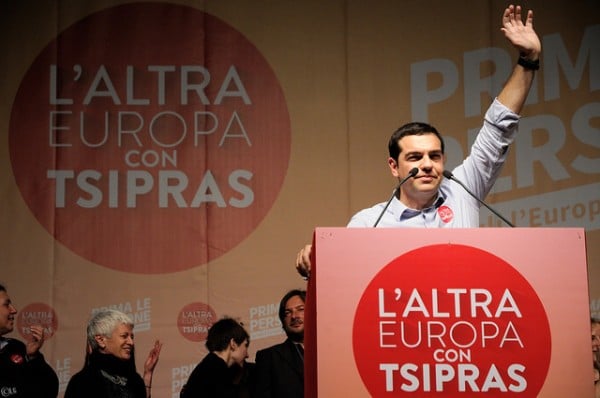
Alexis Tsipras in 2014. Photo Credit: Lorenzo Gaudenzi
In the Orthodox tradition, Lent and Holy Week are traditionally a period of fasting and obedience in an effort to find one’s way back to God. It’s a time of reconciliation with one’s neighbors, one’s self, God, and in some cases, nation-states.
In other words, the meeting between Greek and Russian leaders this week couldn’t have come at a more appropriately symbolic time.
Alexis Tsipras, the somewhat-newly elected leftist prime minister of Greece, headed to Moscow this week to talk shop with Vladimir Putin. Despite the alarm bells that sounded throughout the West over Greece’s so-called pivot to Russia, the meeting between the two leaders didn’t amount to much beyond a promise to “revive and restart” relations between the two countries. Still, some called it a “Trojan Horse” — a way for Putin to exert his influence over the European Union by sneaking in with the help of an intermediary.
Putin, of course, denied this claim. “About mythology and Trojan horses and so forth: the question would be valid if I was the one going to Athens. [But] we are not forcing anyone to do anything,” he said.
Indeed, Greece received little. There were some vague promises of investment in various energy projects, some discussion of European sanctions (which Tsipras continues to condemn), and talk of boosting tourism between the two countries. Greece did get an icon looted by the Nazis back, but that was about it.
With both countries between a rock and a hard place, there is some cause for returning to more normal relations. Both once had strong economic bonds. Russia once accounted for approximately 14 percent of Greece’s imports. Until Russia implemented an embargo on EU produce in August 2014, Greece’s agricultural industry had relied on Russia as a key trading partner. Prior to the embargo, Russia took in approximately 60 percent of Greece’s peach and 90 percent of its strawberry exports. Russia has offered to try to finagle a way to permit Greece, but not the rest of the EU, to import agricultural products, but the meeting bore no fruit on this front. It’s unlikely that Russia, with its own economic woes, could even come close to matching Greece’s trade with the EU. Investment on other fronts is also largely the stuff of dreams for the same reason.
Rhetoric aside, the meeting shouldn’t be a cause for alarm for Greece’s European partners. Russia knows it can’t match the EU’s economic prowess. Plus, Putin would probably find a better partner in Greece’s far-right parties, such as the Golden Dawn, than its far-left ones.
Ultimately, the main reason Tsipras’ charm offensive with Russia is so limited boils down to the fact that Greece’s economic troubles are not Russia’s to bear. “Greece isn’t a beggar asking different countries to solve its financing problems for an economic crisis that doesn’t concern only Greece but is European,” Bloomberg reported Tsipras as saying. “It’s not a Greek problem, it’s a European problem. To the European problem, a European solution will be found.”
Like his predecessors, Tsipras understands that Greece’s economic crisis isn’t a burden it bears alone — it’s one that should fall on the shoulders of the whole of Europe. Greece isn’t ready to schlep its problems onto a third party, nor should it have to.
This was cross-posted with The Eastern Project, a Medium collection.